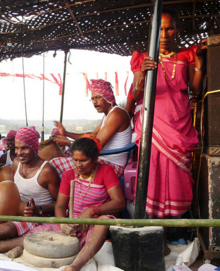|
Kudumbi
The Kudumbi, also referred to as the Kunubis, the Kurumbi, or the Kunbi, are traditionally a Konkani-speaking farming community residing in Kerala, India. They are a branch of the kudumban/kudumbiyar(Devendra Kula velalar) of Tamilnadu.[1][2] HistoryGoan legacyAccording to Goan historian Anant Ramakrishna Dhume, the Kunbi caste are modern descendants of ancient Mundari tribes. He refers to several words of Mundari origin in the Konkani language and also elaborates on the deities worshipped by the ancient tribe, their customs, methods of farming, etc.[3][full citation needed] G. S. Ghurye says that "Kurmi, Kanbi and Kunbi perhaps signify the occupation of the group, viz., that of cultivation, though it is not improbable that the name may of tribal origin."[4] The Kudumbi were forced to migrate from Goa following religious persecution by the Portuguese during the Goa Inquisition, which sought to suppress Hinduism. The Kudumbis, along with Gouda Saraswat Brahmins, Daivajnas and Vaishya Vanis who wanted to preserve their religious and cultural identity, migrated from Goa along the west coast of India, primarily through sea voyages.[citation needed] Some of the groups that fled Goa landed in coastal districts of state of Karnataka, that is, the Uttara Kannada, Dakshina Kannada and Udupi districts, and some groups voyaged further to Kerala.[5][full citation needed][need quotation to verify] The sociologist Y. R. Rao (2003) conducted fieldwork among the Kudubis from Goa who were living in a region of Karnataka. He studied a wide range of behaviours including those related to their food habits, taboos, language, economy, political organisation, kinship and marriage. He identifies Hinduisation, Sanskritisation and Modernisation as three factors that might influence behavioural changes.[6]  Current statusK. R. Gowri Amma, a prominent figure in the communist movement in Kerala and former Minister, in her autobiography narrates the backwardness of Kudumbi Community as:
V. K. Valath says that the main agricultural labourers in the islands around Kochi have been from the Pulaya and Kudumbi castes. He adds that, whilst many people of the Pulaya and Mukkuvar castes converted to Christianity during the Portuguese period, the Kudumbis retained their traditional religious beliefs.[8][page needed][need quotation to verify] The community is officially classified as being within the Socially and Economically Backward Communities (SEBC).[9] Kudumbi templesHoli, the festival of colours, is celebrated in many Devi temples by the Kudumbi.[10] See alsoReferences
Sources
Wikimedia Commons has media related to Kudumbi people. |
||||||||||||